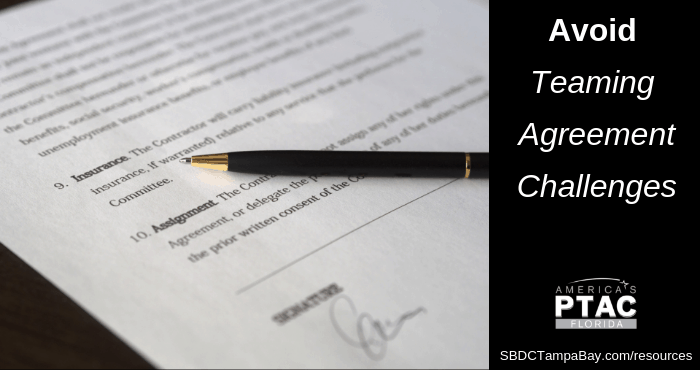Tips to Avoid Teaming Agreement Challenges
 by Yolanda Goodloe | Florida PTAC at PCED | December 3, 2018
by Yolanda Goodloe | Florida PTAC at PCED | December 3, 2018
As a small business, getting government contracts can be hard especially without knowledge of the procedures. These businesses oftentimes find that they need to team up with others in order to stand a chance to secure the contract. As such, there is a need to understand what resources are available and where to go to get pertinent information in regards to teaming agreements. Here are some tips that will help you understand how to improve your working relationships and construct a teaming agreement to avoid challenges that might affect operations.
Statement of Purpose
Most teaming agreements start with a Statement of Purpose, which defines terms that the parties will work within to maintain confidentiality. Businesses should, therefore, understand their intentions and define them from the start to avoid issues in the future, especially after they have been awarded a sub-contract. In cases of any legal issues, this Statement of Purpose will be used by courts of law to evaluate the intentions of the involved team.
Subcontracts
In most teaming agreements, there is always a team leader. Government contractors are expected to use precise language in regard to the obligations of the team leader; whether they will award a subcontract or not. Terms of this agreement should, therefore, state that the team leader will award a subcontract when they get a prime contract from the government, and other parties will execute their portion of the work in the agreement. These predetermined subcontracting terms will help members to execute their subcontracts without the need for further negotiations.
Scope of Work
It is not always possible to define the scope of work or negotiate the terms of a proposed subcontract due to the changing nature of government procurements. However, the teaming members need to define the scope of work as best they can in reference to the Request for Proposal (RFP), the inclusion of a detailed description of the work as an exhibit, or use of the narrative description of the scope of work in the agreement.
The scope of work should also seek to protect the team leader in cases where the government is not satisfied with the work product. This will allow the team member to make some changes to the scope of work based on feedback, circumstances, or instructions from the contract administrator.
Termination of the Teaming Agreement
Teaming agreements need to have a clause to determine the actions to be taken in case there is a disagreement between members. For example, the team members have a right to replace a subcontractor when they cannot deliver their part of the agreement. The terms on the replacement should be stated. Such a clause will protect the team from disbanding just because a single subcontractor cannot deliver their part of the agreement.
Hire a Contract Attorney
While participating in a teaming agreement, you may experience a wide range of legal issues in the government contract life cycle. Consequently, finding an attorney who specializes in the government contracting space is a resource that you must have.
Teaming agreements add a layer of responsibility and liability to the already complex federal contracting regulations. Having an attorney to help you draft, negotiate, or review contracts is an important resource in the teaming agreement process.
Defining your intentions, using precise language, properly defining roles, and addressing issues before they arise are important steps for understanding how to improve your working relationships and constructing a teaming agreement to avoid challenges that might affect operations.
Taking advantage of teaming agreements can be a rewarding experience for small business owners, but they should not be entered into or explored without consulting a qualified attorney or until you have developed the capabilities and resources to fulfill your obligations to the team effectively.
This Procurement Technical Assistance Center (PTAC) is funded in part through a cooperative agreement with the Defense Logistics Agency.





Yolanda Goodloe
Consultants, Cowart, Government Contracting Consultants, PinellasFlorida PTAC at Pinellas County Economic Development
Specialty: Procurement
Yolanda Goodloe has more than 20 years of experience in public service at the local and municipal levels. Early in her career, she worked as a human resources and relations professional while serving as a liaison to the business community and advocacy groups. Her prior experience includes being a human relations specialist for Lee County Government, and an equal opportunity director for the City of Fort Lauderdale. Her background combines public service and human relations experience with hands on leadership in equal opportunity, supplier diversity, business certifications programs, organizational training and development, and managing workforce diversity principles. Goodloe is the procurement specialist for the Florida PTAC at Pinellas County Economic Development. She connects businesses to resources and tools for state, local, and federal contracting opportunities. She is a Certified Procurement Professional (CPP), a Supply Chain Management Professional (SCMP), and a Certified Verification Counselor. She graduated from Florida State University with a bachelor of arts in political science and history.